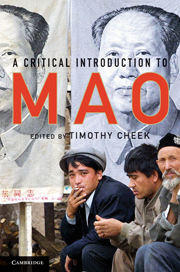Book contents
- Frontmatter
- Contents
- List of Illustrations
- About the Contributors
- Preface
- Acknowledgments
- Timeline of Twentieth-Century China
- Maps
- Part I Mao's World
- Part II Mao's Legacy
- 10 For Truly Great Men, Look to This Age Alone: Was Mao Zedong a New Emperor?
- 11 Recent Mao Zedong Scholarship in China
- 12 Third World Maoism
- 13 Mao's Journeys to the West: Meanings Made of Mao
- 14 Two Perspectives on Mao Zedong
- Appendix: Selected Further Readings (Annotated)
- Index
- References
11 - Recent Mao Zedong Scholarship in China
Published online by Cambridge University Press: 05 August 2012
- Frontmatter
- Contents
- List of Illustrations
- About the Contributors
- Preface
- Acknowledgments
- Timeline of Twentieth-Century China
- Maps
- Part I Mao's World
- Part II Mao's Legacy
- 10 For Truly Great Men, Look to This Age Alone: Was Mao Zedong a New Emperor?
- 11 Recent Mao Zedong Scholarship in China
- 12 Third World Maoism
- 13 Mao's Journeys to the West: Meanings Made of Mao
- 14 Two Perspectives on Mao Zedong
- Appendix: Selected Further Readings (Annotated)
- Index
- References
Summary
This chapter is a critical review of recent Mao Zedong scholarship in China based on a reading of relevant literature of nearly 3 million Chinese words. It aims to acquaint Western readers with the various points of view, assumptions, and controversies in Mao scholarship in the People's Republic of China (PRC). In consideration of the limited space, this chapter will give only a general account of the positions taken by Chinese scholars, with quotations only from original literature.
This chapter is divided into four parts: (1) the subtle changes of official ideology, (2) the criticisms of the Liberal school, (3) the arguments of the New Left scholars, and (4) the narratives of the Historical school. I will recapitulate the main points and themes of these schools in succession and then offer a brief conclusion.
THE SUBTLE CHANGES IN OFFICIAL IDEOLOGY
Official ideology refers to the interpretation of Mao and his thought by the ruling party [the Chinese Communist Party (CCP)], which controls the power of political discourse in Chinese Mao scholarship in order to reinforce its own political legitimacy. From this perspective, the primary task of Mao studies is to strengthen the influence of the official political discourse. It is worth noting that there exists an approach of subofficial ideology that reinterprets the official points of view on Mao by decorating them with academic language without deviating from the orthodox teaching.
- Type
- Chapter
- Information
- A Critical Introduction to Mao , pp. 273 - 287Publisher: Cambridge University PressPrint publication year: 2010

